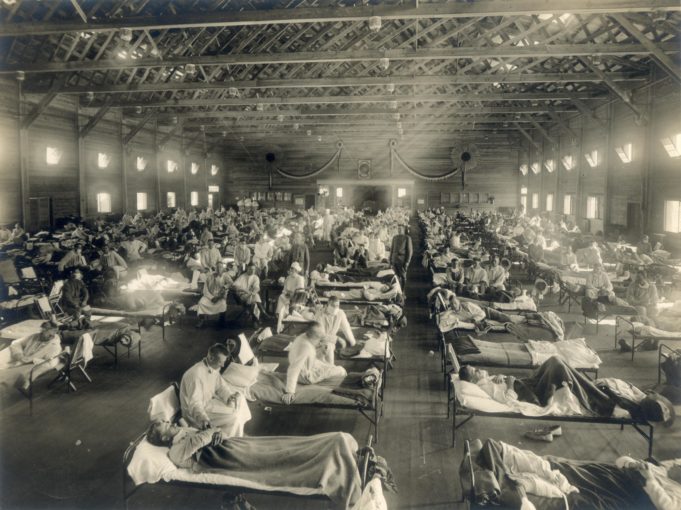Sometime back in the 1970s, while visiting my grandparents on the east side of Fort Worth, I ran across a puzzling photo in an old album. There was Grannie Mac (my great grandmother) flanked by her young sons, Taylor and Charles (my grandfather), but between the boys was a baby I couldn’t place. “Who’s the baby?” I asked.
My grandfather cleared his throat, “My little sister.”
I’d never heard of a sister. How could this be? When I pressed for details, it became clear Granddad really didn’t want to talk about it.
“Spanish flu got her,” he said grimly.
Despite its street name, our best guess is the Spanish flu originated on a military base in Kansas. This was during the first World War. It is further speculated that by late 1917, there had been a first wave of the epidemic in 14 U.S. military camps.
Communication technology was much more limited then, but the death toll of the global pandemic of Spanish flu was estimated between 50 and 100 million, this in a global population of only 1.9 billion. That’s a disaster of Biblical proportion.
A little over 100 years later, we find ourselves amid another global pandemic. What do these events have in common and how have things changed?
Most of what we hear in mainstream media is grandstanding or criticism. As political footballs go, this could be the Super Bowl. Despite its American origin, the 1917 virus was tagged “Spanish flu” for political reasons, just as our president refers to the present problem as the “Chinese virus.”
The world was completely unprepared for the last century’s pandemic, just as to some extent we are unprepared today. Some countries seem to have had a more proactive foresight than the United States, probably because our healthcare system is a strictly profit-motivated enterprise.
On the positive side, we have much greater access to essentials than our ancestors did, and the internet has made worldwide communication virtually instantaneous. As a race, we are in a much better position to contain the virus and weather the inconveniences and tragedies inevitable in such a situation. Just 100 years ago, millions died from rampant contagion. The death toll in this pandemic will likely be a miniscule fraction of that. We have reason to applaud this progress.
By the time my grandfather’s younger sister died, he’d already experienced a great deal of tragedy in his young life. His father, a circuit-riding Methodist minister, had drowned while looking for a place to baptize congregants; a log cabin where they were living had burned to the ground, destroying all their worldly possessions; and at age 12, my grandfather had to leave school and go to work to help support the family. Little wonder Granddad didn’t want to reminisce about those times.
How will you remember the great pandemic of 2020?













It was a good article until like you mentioned our media reports are grandstanding and critical. True as that is ,you placed yourself on the same plane by interjecting your criticism of the President calling it the Chinese flu and interjecting your opinion of our healthcare system. Your article would have been better served without your opinions.
100 years ago people erroneously thought the Spanish Flu began in Spain. Therefore we should not state that the first outbreak of COVID-19 occurred in China.
Hard to tell if this is the FW Weekly or the People’s Daily.
Great article with all those facts: like this virus being called Chinese virus by the USA’S PRESIDENT and the soulful sad truth about the HEALTHCARE SYSTEM; all about the $$…sad to see it in writing but who are we kidding everyone knows this. For those That choose to put their head in sand well they just need to keep it there …!besides this is your article.
For those who don’t t agree will have to voice their version of thing in their own article… ! Js